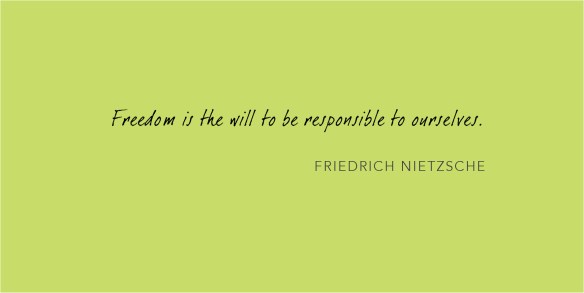
Nietzsche wrote that human history has been shaped by the power dynamic between the few who are part of the controlling “master” class, and the many “slaves” who are being controlled. He was convinced that this dynamic would never change by any action on the part of the master—why would those in power willingly give it up? The oppressed would have to rise up and change things for themselves.
Many idealistic teachers—myself included—come to the profession with a desire not just to educate but to help “empower” their students.
I’ve thought a lot about Nietzsche’s ideas as they relate to my experience and observations as a public school teacher. Many idealistic teachers—myself included—come to the profession with a desire not just to educate but to help “empower” their students. I think most of us would accept Nietzsche’s belief that ultimately, people must seize power for themselves; our role as teachers is to support that effort from the sidelines.
But when Nietzsche gets down to the gritty details of what it would actually take to change the existing power dynamic, he says some things that may be quite hard to swallow for today’s progressive idealists. He says the power imbalance perpetuates itself because the slave keeps himself a slave through his own state of mind. The slave takes on his oppression as an identity that makes him morally superior to the master: I am better than the ruler because the ruler is unjust and immoral. Because the slave cannot exert power over the ruler, he comes up with all kinds of excuses and justifications for his powerlessness. Nietzsche says there’s no way out of this—as long as you stay in resentment and blame, then you’re always waiting for someone else to change before you are in power. You have to seize the will to power for yourself, by yourself—and this means taking responsibility for your own life.
The slave takes on his oppression as an identity that makes him morally superior to the master….
Working in the public schools, teachers see many students experience a huge amount of suffering, and find it impossible to accept that these kids are in any way responsible for their hardships. I personally have struggled a lot with this issue. Perhaps a student’s parents are in jail, or their close friend was recently killed. It seems clear we can’t hold a child responsible for something like that. Then we quickly go one step further—we feel we can’t hold kids responsible for actions that seem like the “natural” results of these difficult circumstances, such as bad behavior and poor effort.
 But as soon as we start to see a student’s present difficulties as the expected, inevitable outcome of her past, we begin to perpetuate an ugly and incredibly disempowering dynamic. The student, out of anger and a sense of powerlessness, blames others for her problems, and the teacher, out of guilt and pity, encourages this perspective, and often takes on some of the blame herself. Can we really expect positive outcomes when we are motivated by such negative emotions? And how can we genuinely believe our students are powerful if we see them as entirely controlled by history and circumstance, with no room to grow or change?
But as soon as we start to see a student’s present difficulties as the expected, inevitable outcome of her past, we begin to perpetuate an ugly and incredibly disempowering dynamic. The student, out of anger and a sense of powerlessness, blames others for her problems, and the teacher, out of guilt and pity, encourages this perspective, and often takes on some of the blame herself. Can we really expect positive outcomes when we are motivated by such negative emotions? And how can we genuinely believe our students are powerful if we see them as entirely controlled by history and circumstance, with no room to grow or change?
In encouraging feelings of victimization, teachers often end up sending a very contradictory message to their students
In encouraging feelings of victimization, teachers often end up sending a very contradictory message to their students: everything that’s happened to you so far has been out of your control—but now you have the power to change your life. The inconsistency of this message is not lost on the kids, even if they aren’t fully aware of it. And if they can’t trust what we’re telling them, it’s likely that they will feel less powerful, not more so.
We can empathize with feelings of anger, frustration, blame and resentment, and see how these emotions are, in a sense, “justified”—but we can’t put too much focus here, we can’t encourage these habits of thought and feeling, because that will only hold our students down. When you’re focused on blaming, it’s easy to get tangled in complex webs of causes, patterns and circumstances, which is confusing, frustrating, and generally leads nowhere.
Holding students responsible for their own lives is not about “blaming the victim.” It’s not about saying, it’s your fault that you don’t have a lot of money; it’s your fault that you were in the hospital and missed a year of school. It’s about saying, you may not be able to control everything, but you can control a lot more than you think. It’s about moving beyond blame, shifting the focus away from the challenges of the past and towards the potential of the present moment.
